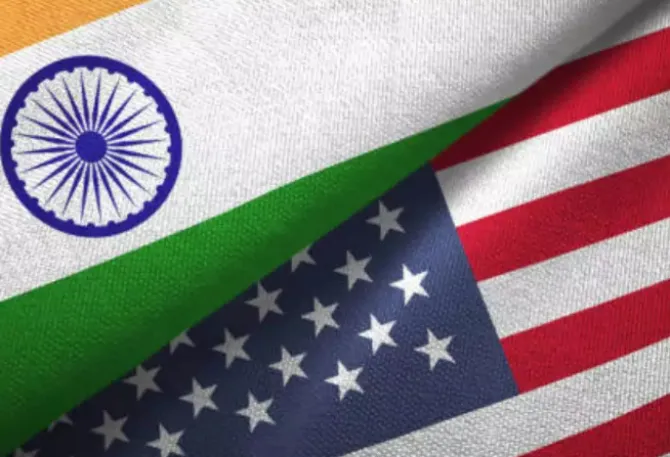-
CENTRES
Progammes & Centres
Location
Educational cooperation between India and the United States (US) has gone from strength to strength, and there is much more that can be done.

In A Way to Wealth (1757), Benjamin Franklin famously said, “An investment in knowledge pays the best interest.” This is a truth most countries have internalised. Since 2015, UNESCO’s member states, for instance, have agreed on a quantum of educational funding of 4-6 percent of their Gross Domestic Product, or 15-20 percent of public expenditure, and most nations are currently in the process of attaining these thresholds. Groups of states like the G20, originally mandated to promote economic and financial stability, also now formally recognise the importance of delivering quality education and enabling the development of human capital. The recently released G20 New Delhi Leaders’ Declaration reaffirmed its commitment to support academic collaboration, and to “encourage mobility of students, scholars, researchers, and scientists across research and higher education institutions”. Indeed, cross-border educational partnerships and exchange programmes have emerged as key tools for knowledge-based empowerment, and for strengthening cultural relations through the demonstration of soft power.
Groups of states like the G20, originally mandated to promote economic and financial stability, also now formally recognise the importance of delivering quality education and enabling the development of human capital.
The growth of educational ties between India and the US is a case in point. Addressing American students during Prime Minister Modi’s historic state visit to the US in June, First Lady Jill Biden said, “Education is the cornerstone of the bond between India and the United States. Students from both countries are learning and growing alongside each other, discovering the people that they want to become and building a better world together.” The Prime Minister drew attention to the fact that 750 faculty members from the US were already in India as part of a bilateral technology partnership. To maintain their rapid momentum of growth, the PM observed, both countries need a “pipeline of talent”; and while the US is home to “top-class educational institutions and advanced technologies”, India has the “world’s biggest youth factory”. Clearly there are promising synergies in place which Indo-US educational relations could build upon. For much of its life as a nation, India’s much studied “brain drain” has been a cause of concern for policymakers, academia, and industry. The emigration of talent adversely impacted the formation of domestic human capital, and the US stood to gain, with over half of all Indian emigrants settling in the States. This trend has not declined significantly, but the establishment of several major bilateral educational initiatives have made for transformational exchanges that allow Indian experts to benefit from advanced American research, and American academics and practitioners to learn from their Indian counterparts.
For much of its life as a nation, India’s much studied “brain drain” has been a cause of concern for policymakers, academia, and industry.
Among the most pivotal of these programmes in the new century was the US-India Knowledge Initiative on Agricultural Education, Teaching, Research, Service, and Commercial Linkages, launched in 2005, which sought to promote agricultural cooperation through a broad spectrum of interventions. This was followed a few years later by the Indo-US 21st Century Knowledge Initiative that expanded the fields of cooperation between higher education institutions (HEIs) in both countries to include climate change, food security, sustainable energy, and public health. For both Knowledge Initiatives, the overarching goals were economic as well as cultural—to encourage mutual understanding, educational reform, and economic growth. The launch of the Global Initiative for Academic Networks (GIAN) by India in 2015—to facilitate exchanges between Indian HEIs and researchers, scientists, and industry experts from around the world—has seen the enthusiastic participation of American experts since its inception. And the Fulbright-Nehru programme, of course, has played a crucial role in furthering the exchange of outstanding academics and professionals between both countries, and deepening India-US relations. The 2020s are witnessing a new surge of joint activity in the India-US education space, with the convergence of several different elements. Since the global outbreak of the pandemic, online learning has exploded and large numbers of new e-learning products and services have been rolled out at breakneck speed. Today, India is one of the largest markets for American edtech players such as Coursera, Udemy, and Udacity outside the US, and edtech-focused investors remain bullish about the sector’s growth in the country, maintaining that “India is the most important market for us”. Even as American firms vie for a greater share of the Indian online learning market, India’s edtech firms too are going global and entrenching themselves in American and other markets. Byju’s, Simplilearn, Emeritus, and Scaler, for example, have stepped up their American operations, leading to intense competition, an accelerated race for funding, and increasingly high-quality educational solutions. This environment of constructive competition and occasional collaboration between American and Indian edtech companies could mainstream cutting-edge learning solutions and help raise educational standards across geographies.
Even as American firms vie for a greater share of the Indian online learning market, India’s edtech firms too are going global and entrenching themselves in American and other markets.
Launched at the height of the pandemic, India’s forward-looking National Education Policy 2020 has unlocked a wealth of possibilities for Indo-US cooperation in education, with legislative frameworks now being set up to enable foreign universities to open campuses in India. India is especially keen to woo universities ranked among the top 500 globally—it has already entered into a dialogue with at least 10 top-ranking American universities, and is also exploring other kinds of joint academic programmes with American institutions. Importantly, the idea of Indian universities being allowed to open and operate in the US is being examined as well. Following PM Modi’s state visit, a high-level India-US task force has recommended that both countries establish dedicated offices within their respective diplomatic outposts that could assist global universities set up branch campuses in each other’s country. These initiatives must be pursued vigorously as they could act as models for the globalisation of curricula, pedagogy, and research.
The India-US 2+2 Ministerial Dialogue in April 2022 was a watershed moment. A joint statement lauded the dynamic educational linkages between the two countries, and their continued commitment to work together was reflected almost immediately by the formation of a new India-US Working Group on Education and Skill Development. Among other areas, the Working Group will concentrate on skilling and technical and vocational education, support the development of training programmes that are aligned with contemporary industry needs, and help create progressive industry-academia interfaces. This focus on skilling dovetails well with the priorities outlined by PM Modi and President Biden in June. Both leaders drew attention to the wide-ranging tech partnerships the two countries were entering into, much of which involved a deep focus on critical and emerging technologies. The operationalisation of this vision would require “US and Indian industry, government and academic institutions” to capitalise on “greater technology sharing, co-development, and co-production opportunities”, which in turn would call for a new generation of research, development, and technical skills. In this regard, the recent proposal for identifying a select group of Indian and American universities as “Indo-US Global Challenge Institutes”, and funding them to work jointly on specific tech- and development-related issues is a sound one, and should be actualised.
Both leaders drew attention to the wide-ranging tech partnerships the two countries were entering into, much of which involved a deep focus on critical and emerging technologies.
The mid-point of the timeframe for achieving the 2030 Agenda has now been reached, and there is a renewed sense of urgency globally about accelerating progress towards the Sustainable Development Goals (SDGs). This could be the right moment for scaling up India-US research efforts that seek to develop implementable solutions for advancing the SDGs. Moreover, just as American participation in Indian initiatives such as GIAN could be expanded, further opportunities could be created for Indian experts to be hosted at core American scientific facilities, leading to a knowledge exchange and improved familiarisation with newer processes that might eventually catalyse R&D in both countries. Additionally, international internships and apprenticeships could give young researchers and practitioners valuable opportunities to launch careers while contributing to national efforts. Finally, at a time when India-US educational partnerships are beginning to focus overwhelmingly on science and tech, there is a need to promote greater collaboration around the humanities, social sciences, and liberal arts. The relentless pursuit of technological prowess and scientific supremacy should not blind the world’s oldest and largest democracies to the softer cultural ties that bind them.
Anirban Sarma is a Senior Fellow and Deputy Director at Observer Research Foundation
The views expressed above belong to the author(s). ORF research and analyses now available on Telegram! Click here to access our curated content — blogs, longforms and interviews.

Anirban Sarma is Director of the Digital Societies Initiative at the Observer Research Foundation. His research explores issues of technology policy, with a focus on ...
Read More +